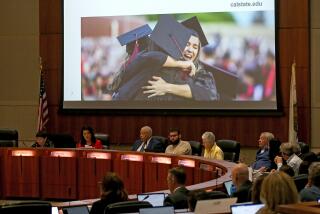State Bar President Ends Year’s Tenure to Mixed Reviews
- Share via
San Diego attorney Colin Wied’s presidency of the State Bar of California ends this weekend, marking a year of notable accomplishments but mixed reviews about his leadership style.
During the year, the bar raised dues $141 and reformed its much-maligned system of identifying and punishing unethical attorneys.
Its policy-making board, the 23-member Board of Governors, laid the groundwork for an extensive continuing-education plan for lawyers, decided to study whether non-lawyer “legal technicians” can handle routine legal matters, and voted to spend $250,000 on a public education campaign aimed at explaining what lawyers and judges do.
At the bar’s annual meeting, in its second of four days today at the Town & Country Hotel in San Diego, some board members say they deserve the credit for a job well done.
“I’m not denying Colin was president,” said Frank Winston, a San Francisco attorney and an outgoing board member. “But what I’m suggesting was he had some lieutenants who couldn’t be held down any longer.”
Winston and others of those “lieutenants”--the seven vice presidents who were serving their third and final year on the board--said they were simply a group that made things happen.
“We had a group of activists who didn’t want to have nothing happen in their . . . three years on the board, so they picked up the cudgel and did some good things,” said one of the seven, Alan I. Rothenberg, a Los Angeles lawyer. Rothenberg was elected this summer to succeed Wied as president.
Wied had an “excellent” year, Rothenberg said. But he added: “Let’s say (Wied) was smart enough to see what (the seven) were doing and let them go do it. If he had not liked it, he would have been able to exercise his presidential prerogative.”
Wied’s vice presidents and other bar observers were quick to commend Wied for being the consummate hard worker. His own San Diego law partnership, which specializes in bankruptcy matters, broke up while he was bar president and left him in solo practice, in part because he was spending so much time on bar matters.
Difficulty With His Style
The difficulty that board members said they had with Wied, a former naval aviator who retired as a captain in the Judge Advocate General Corps, was simply with his style.
Kathy Neal, one of the board’s six non-lawyer public members, is an Oakland political activist. “Essentially, I think Colin (has) mostly run the meetings, and I’ve had some problems with the way he’s done that,” she said, calling him “overly heavy-handed.”
Another public member, Richard Annotico, a Los Angeles businessman, said Wied was “somewhat dictatorial.” If Wied “had another fault, I would say he is not a consensus-maker. But then again, neither am I.”
John L. McDonnell Jr., a board member and Oakland attorney, said Wied’s “leadership style to me was perplexing at times. But, because the members of the Board of Governors are so collegial, they were able to work together so well that we accomplished a lot under Colin’s leadership.”
Wied often sent “mixed signals” about the direction he wanted the board to go, McDonnell said. “But the important signals were the signals that we got at the beginning of his term that set the goals for the year. I really think that, to a large extent, those goals have been accomplished.”
Wied said in a recent hourlong interview that he was “anything but dictatorial.”
Criticism that he was “heavy-handed” was not “legitimate,” he said. “It’s been a self-fulfilling prophecy by the press. That’s not to say that certain elements aren’t true.”
But Wied also said he doesn’t “waste much time worrying about how my presidency is going to be viewed.”
More important than who gets the credit, he said, is whether the job got done. And Wied said he is confident that he helped the bar make headway during the past year on a number of fronts, mostly because it finally was able to look beyond the discipline issue.
That issue had so dominated the bar for the past four or five years that virtually everything else was put on a back burner, said incoming president Rothenberg.
The issue grabbed headlines with each report issued in recent years by State Bar Monitor Robert C. Fellmeth, a professor at the University of San Diego law school who harshly criticized the bar’s discipline system. The bar had a massive backlog of consumer complaints, causing intolerable delays in reprimanding attorneys whose conduct deserved prompt attention, he said.
System Dramatically Revamped
In turn, the delays fanned charges that the bar was protecting the profession it was supposed to be regulating.
Prodded by Fellmeth, the bar dramatically revamped that system. A six-judge discipline court--and a three-member appeals panel--began work two weeks ago, replacing a sometimes unreliable army of volunteer attorneys whose verdicts were criticized as inconsistent.
Other reforms included hiring more investigators to reduce workloads and raising pay to attract qualified people and improve morale.
Wied readily concedes that most of the work of reorganizing the discipline system, and the need to convince legislators to approve a change, occurred before he took office. But he got stuck with what observers figured would be a chorus of complaints from lawyers unhappy about the increase in their mandatory dues--from $276 to $417 a year, highest in the nation--to help pay for the new emphasis on discipline.
Wied said he believes the discipline problem is now “under control.”
Backlog of Cases Remains
In his latest report, issued Sept. 1, Fellmeth said that the bar “continues to make substantial progress” in improving the discipline system. But he said that “the system cannot be considered ideal or even acceptable given serious remaining deficiencies,” including a backlog of cases in the intake, investigation and prosecution offices.
That movement at least freed the bar to address other issues.
At its meeting last month, the board approved an ambitious statewide program to teach newer attorneys the basic skills they need to perform work competently.
Attorneys who go from law school to a big law firm, a major corporate law office or a government post often can find the right reference book or the right in-house expert to help solve a problem, Wied said. The bar’s program will be aimed at lawyers without that luxury, particularly new graduates hanging up their shingle or those who practice in smaller towns, he said.
The plan will be funded by an innovative scheme that will siphon off a percentage of lawyers’ malpractice insurance premiums, eventually becoming a $3-million or $4-million annual business, Wied said.
Even in the passage of that plan, however, which Wied said is the one item “closest to my heart,” there was little glory for him from fellow board members.
“I think (Wied) righteously can be enthusiastic about it,” Annotico said. But a “fair share of the credit” goes to the seven board members and bar staff members Wied himself identified in a recent legal magazine article as proponents of the plan, Annotico said.
The August meeting also saw the bar approve a plan--though a watered-down one--to study non-lawyer legal services.
The vote to approve the study of “legal technicians,” who might handle simple legal services, such as preparing an uncontested divorce, that lawyers won’t do or will charge too much for, does not explicitly say such services should be allowed. It also leaves open the question of who should regulate non-lawyers’ legal work.
The $250,000 public relations campaign “is going to benefit the public immensely,” he said, adding that the bar has to “get the word to the public that the system is open to them.”
Neal voted against the plan. “I think (the plan) is the biggest BS I’ve ever heard in my life,” he said, calling it a “thinly veiled attempt at going and doing a big promotion campaign for the profession.”
Rothenberg, who succeeds Wied as president in ceremonies Sunday, supports the plan.
More to Read
Sign up for Essential California
The most important California stories and recommendations in your inbox every morning.
You may occasionally receive promotional content from the Los Angeles Times.










